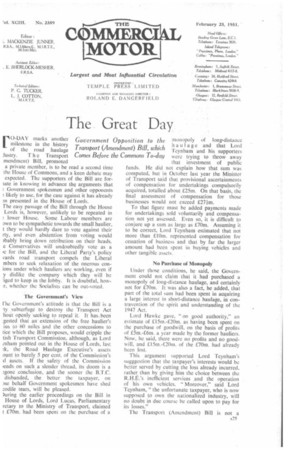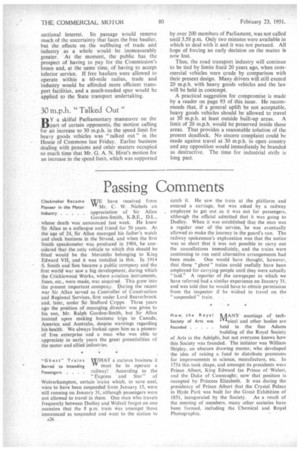The Great Day
Page 27

Page 28

If you've noticed an error in this article please click here to report it so we can fix it.
1,0-DAY marks another milestone in the history of the road haulage Justry. T h e Transport mendment) Bill, promoted a private mentber, is to be read a second time the House of Commons, and a keen debate may expected. The supporters of the Bill are forlate in knowing in advance the arguments that ; Government spokesmen and other opponents ; likely to use, for the case against it has already tit presented in the House of Lords.
The easy passage of the Bill through the House Lords is, however, unlikely to be repeated in lower House. Some Labour members are Dwn to be sympathetic towards the small haulier, t they would hardly dare to vote against their rty, and even abstention from voting would thably bring down retribution on their heads. e Conservatives will undoubtedly vote as a ic for the Bill, and the Liberal Party's policy yards road transport compels the Liberal mbers to seek telaxation 'of the onerous conions under which hauliers are working, even if y dislike the company which they will be 'iged to keep in the lobby. It is doubtful, howl-, whether the Socialists can be out-voted.
The Government's View Ile Government's attitude is that the Bill is a ty _subterfuge to destroy the Transport Act bout openly 'seeking to repeal it. It has,been ,gested that an extension of the free haulier's ius to 60 miles and the other concessions to lice which the Bill proposes, would cripple the tish Transport Commission, although, as Lord /nham pointed out in the House of Lords, last 1, the Road Haulage Executive's assets mint to barely 5 per cent. of the Commission's LI assets. If the safety of the Commission lends. on such a slender thread, its doom is a !gone conclusion, and the sooner the B.T.C. disbanded, the better the taxpayer, on me behalf Government spokesmen have shed eodile tears, will be pleased.
)uring the earlier proceedings on the Bill in House of Lords, Lord Lucas, Parliamentary retary to the Ministry of Transport, claimed t £70m. had been spent on the purchase of a monopoly of long-distance Ii aulage and that Lord Teynham and his supporters were trying to throw away that investment of public funds. He did not explain how that sum was computed, but in October last year the Minister of Transport said that provisional aseertainments of compensation for undertakings compulsorily acquired, totalled about £25m. On that basis, the final assessment of compensation for those businesses would not exceed £274m.
To that figure must be added payments made for undertakings sold voluntarily and compensation not yet assessed. Even so, it is difficult to conjure up a sum as large as £70m. Assuming it to be correct, Lord Teynham estimated that not more than flOm. represented compensation for cessation of business and that by far the larger amount had been spent in buying vehicles and other tangible assets.
No Purchase of Monopoly Under those conditions, he said, the Government could not claim that it had purchased a monopoly of long-distance haulage, and certainly not for £70m. It was also a fact, he added, that part of the total sum had been spent in acquiring a large interest in short-distance haulage, in contravention of the spirit and understanding of the 1947 Act.
Lord Hawke gave, "on good authority," an estimate of £15m.-E20rn. as having been spent on the purchase of goodwill, on the basis of profits of £5m.-£6m. a year made by the former hauliers. Now, he said, there were no profits and no goodwill, and £15m.-£20m. of the £70m. had already been lost.
This argument supported Lord Teynham's sugggestion that the taxpayer's interests would be better served by cutting the loss already incurred. rather than by giving him the choice between the R.H.E.'s inefficient services and the operation of his own vehicles. "Moreover," said Lord Teynham. "the unfortunate taxpayer, who is now supposed to own the nationalized industry, will no doubt in due course be called upon to pay for its losses."
The Transport (Amendment) Bill is not a sectional interest. Its passage would remove much of the uncertainty that faces the free haulier, but the effects on the wellbeing of trade and industry as a whole would be immeasurably greater. At the moment, the public has the prospect of having to pay for the Commission's losses and, at the same time, of having to accept inferior service. If free hauliers were allowed to operate within a 60-mile radius, trade and industry would be afforded more efficient transport facilities, and a much-needed spur would be applied to the State transport undertaking.
30 m.p.h. "Talked Out"
By a skilful Parliamentary manceuvre on the part of certain opponents, the motion calling for an increase to 30 m.p.h. in the speed limit for heavy goods vehicles was "talked Out" in the House of Commons last Friday. Earlier business dealing with pensions and other matters occupied so much time that Mr. G. A. N. Hirst's motion for an increase in the speed limit, which was supported by over 200 members of Parliament, was not called until 3.58 p.m. Only two minutes were available in which to deal with it and it was not pursued. All hope of forcing an early decision on the matter is now lost.
Thus, the road transport industry will continue to be tied by limits fixed 20 years ago, when commercial vehicles were crude by comparison with their present design. Many drivers will still exceed 20 m.p.h. with heavy goods vehicles and the law will be held in contempt.
A practical suggestion for compromise is made by a reader on page 93 of this issue. He recommends that, if a general uplift be not acceptable. heavy goods vehicles should be allowed to travel at 30 m.p.h. at least outside built-up areas. A limit of 20 m.p.h. would be preserved inside those areas. That provides a reasonable Solution of the present deadlock. No sincere complaint could be made against travel at 30 m.p.h. in open country and any opposition would immediately be branded as destructive. The time for industrial strife is long past.




















































































